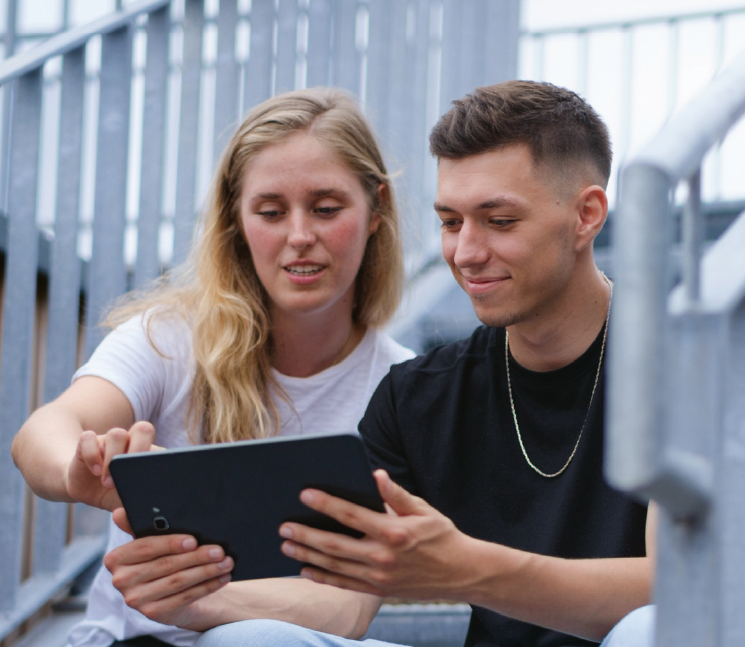digi.prosa: Digital projects in social work
Project background and content
Providing the necessary communication skills to be able to use the new channels of a mediatized society in a confident, self-determined and reflective manner is becoming an essential task of social work. It is increasingly using digital technology to simplify communication, enable participation, create community and awaken creative potential. At the same time, information technology specialists are required to go beyond the pragmatic technical completion of tasks and also consider the communicative consequences of technology, to create products that have an educational purpose, impart skills and enable creative activity and participation.
Good approaches and projects are based on the interests and needs of the target groups and impart sustainable know-how and skills, increase self-efficacy, participation and integration. They can succeed if the professionals are well prepared for this task, are competent and skilled in communication technology and if they cooperate with partners from the field of information technologies in order to develop and adapt customized solutions for their specific areas.
This initial situation leads to the demand that dealing with the mediatized society should be an important part of the training of professionals in the field of social work. On the one hand, an understanding of the opportunities and risks must be conveyed. At the same time, and this is the decisive aspect, the prospective professionals should be familiarized with intervention options, project forms and offers of help. In order to make this as practical as possible, experience with project formats during their studies is a good idea.
For more information on past projects, articles and events, please click here.
Project objective
The focus of the college is on project forms that are based on the interests and needs of the respective target groups and that use current technology in an innovative way. The latest technology can be used to improve communication, maintain contacts and simplify administrative processes and contact with authorities. For example, video conferencing systems can be modified to make them easier to use for older people, or young people can be given access to secure streaming platforms.
Another important area concerns participation and communication. It is difficult for socially disadvantaged people to participate in social processes, take advantage of offers of help or even just keep in touch with other people. Although there are already a number of services available, there are usually barriers to their use. The question here is how these opportunities can be simplified and adapted to the target group. For example, an exchange between the target groups and local politicians and initiatives via video platforms is conceivable. Project formats in which existing offers of help, such as advice, are made more accessible and easier to use through digital technology are also interesting.
Project procedure
In a first step, essential basics concerning the digitalization of social work are taught in joint block seminars. The current state of research is presented and an overview of digital project formats in social work is given. Communication science aspects are also important, showing which motivational potentials can be awakened through the use of current media and how a better communicative infrastructure can be realized. A particular focus is the interlocking of technical requirements and social science concepts and objectives. In joint preparatory rounds, the possibilities of using digital technology are discussed on an interdisciplinary basis.
In close exchange with project partners, project ideas are now being developed. The impetus can either come directly from them or arise from interdisciplinary exchange. These concepts are critically reviewed for their feasibility. Does the project make sense, is there a foreseeable benefit for the specific target group, can it be implemented in the planned time and is it technically feasible? If this can be confirmed, an outline is drawn up, which forms the basis for further planning with the cooperating institutions.
Innovation
At the beginning, the cooperating institutions and companies are introduced. Their representatives present their tasks and target groups, describe the role of digital technology in their institutions and give an outlook on goals and possible project forms. On this basis, teams are formed that are assigned to these collaborations.
The students from the Faculty of Social Sciences will focus primarily on the question of how the projects can be meaningfully integrated into the tasks and concepts of the cooperating institutions, how they can meaningfully complement their services and what kind of support they can provide for the target group. At the same time, the computer science students will clarify the questions of technical feasibility, the provision of the technical infrastructure and the programming implementation. It is important that an increasingly close collaboration develops over the course of the project, that a common goal is achieved synergistically and that both disciplines learn from each other.
Project lead
T +49 (0) 8031 / 805 - 4518 Edeltraud.Botzum[at]th-rosenheim.de
ORCID iD: 0009-0006-5688-9453
Project staff
T +49 (0) 8031 / 805 - 4547 madeleine.doerr[at]th-rosenheim.de
T +49 (0) 8031 / 805 - 2776 petra.fuchs[at]th-rosenheim.de
T +49 (0) 8031 / 805 - 2903 florian.mueller[at]th-rosenheim.de
Project collaboration
Project duration
2022-09-01 - 2026-08-30Project partners
Project management agency

Project funding

Funding programme
Nachwuchsförderung im Bereich Digitalisierung: bidt-DigitalisierungskollegsWeblinks
09/25 Interdisziplinäres Lern- und Studienlabor für Digitalisierung07/24 Praxishandbuch Digitale Projekt in der Sozialen Arbeit
06/23: Regional Fernsehen Oberbayern (rfo): Soziale Studentenmesse an der TH Rosenheim
09/22: bidt Digitalisierungskollegs
06/22: Pressemitteilung StMWK
Förderung
Das Digitalisierungskolleg „digi.prosa: Digitale Projekte in der Sozialen Arbeit“ wird durch das Bayerische Staatsministerium für Wissenschaft und Kunst gefördert und durch das Bayerische Forschungsinstitut für digitale Transformation (bidt) koordiniert.


